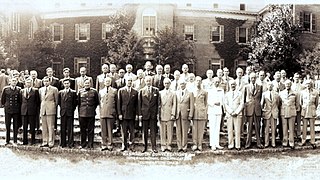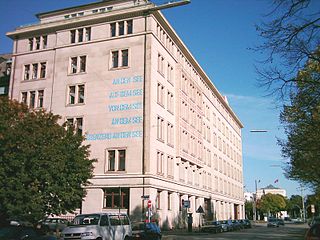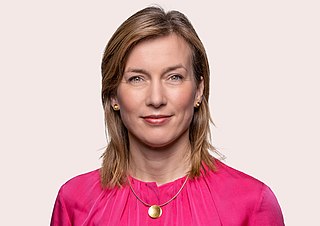Peace Research Institute may refer to:
- Peace Research Institute Frankfurt
- Peace Research Institute Oslo
- Copenhagen Peace Research Institute
- Geneva International Peace Research Institute
- Stockholm International Peace Research Institute
Peace Research Institute may refer to:
IPA commonly refers to:

Peace means societal friendship and harmony in the absence of hostility and violence. In a social sense, peace is commonly used to mean a lack of conflict and freedom from fear of violence between individuals or groups.

The United Nations University (UNU) is the think tank and academic arm of the United Nations. Headquartered in Shibuya, Tokyo, Japan, with diplomatic status as a UN institution, its mission is to help resolve global issues related to human development and welfare through collaborative research and education.

A think tank, or policy institute, is a research institute that performs research and advocacy concerning topics such as social policy, political strategy, economics, military, technology, and culture. Most think tanks are non-governmental organizations, but some are semi-autonomous agencies within government, and some are associated with particular political parties, businesses or the military. Think tanks are often funded by individual donations, with many also accepting government grants.

The Dumbarton Oaks Conference, or, more formally, the Washington Conversations on International Peace and Security Organization, was an international conference at which proposals for the establishment of a "general international organization", which was to become the United Nations, were formulated and negotiated. The conference was led by the Four Policemen – the United States, the United Kingdom, the Soviet Union, and China. It was held at the Dumbarton Oaks estate in Washington, D.C., from August 21, 1944, to October 7, 1944.
SCI may refer to:

Johan Vincent Galtung was a Norwegian sociologist and the principal founder of the discipline of peace and conflict studies. He was the main founder of the Peace Research Institute Oslo (PRIO) in 1959 and was its first director until 1970. He also established the Journal of Peace Research in 1964.

The Peace Research Institute Oslo is a private research institution in peace and conflict studies, based in Oslo, Norway, with around 100 employees. It was founded in 1959 by a group of Norwegian researchers led by Johan Galtung, who was also the institute's first director (1959–1969). It publishes the Journal of Peace Research, also founded by Johan Galtung.

Stockholm International Peace Research Institute (SIPRI) is an international institute based in Stockholm. It was founded in 1966 and provides data, analysis and recommendations for armed conflict, military expenditure and arms trade as well as disarmament and arms control. The research is based on open sources and is directed to decision-makers, researchers, media and the interested public.

Peace and conflict studies or conflict analysis and resolution is a social science field that identifies and analyzes violent and nonviolent behaviors as well as the structural mechanisms attending conflicts, with a view towards understanding those processes which lead to a more desirable human condition. A variation on this, peace studies (irenology), is an interdisciplinary effort aiming at the prevention, de-escalation, and solution of conflicts by peaceful means, thereby seeking "victory" for all parties involved in the conflict.
Kyung Hee University is a private research university in South Korea with campuses in Seoul and Suwon. It was founded in 1949. Kyung Hee University is part of the Kyung Hee University System, which offers comprehensive education from kindergarten through graduate school.
The International Peace Institute is an independent non-profit lobby group based in New York. The institute has regional offices in Europe, and in the Middle East.

Global Peace Index (GPI) is a report produced by the Institute for Economics & Peace (IEP) which measures the relative position of nations' and regions' peacefulness. The GPI ranks 163 independent states and territories according to their levels of peacefulness. In the past decade, the GPI has presented trends of increased global violence and less peacefulness.

The German Institute for Global and Area Studies, also known as GIGA, is a German research institute. It analyses political, economic, and social developments in Africa, Asia, Latin America, as well as the Middle East. It combines its analysis with comparative research on international relations, development and globalisation, violence and security, and political systems. GIGA researchers are sought after by policymakers to advise Germany's Federal Foreign Office, members of Parliament and other branches of the German federal government. The institute is based in Hamburg and has an office in Berlin.
Carnegie Foundation may refer to:

The Nobel Peace Prize is one of the five Nobel Prizes established by the will of Swedish industrialist, inventor, and armaments manufacturer Alfred Nobel, along with the prizes in Chemistry, Physics, Physiology or Medicine, and Literature. Since March 1901, it has been awarded annually to people who have "done the most or the best work for fraternity between nations, for the abolition or reduction of standing armies and for the holding and promotion of peace congresses." The Oxford Dictionary of Contemporary History describes it as "the most prestigious prize in the world."

Dan Smith OBE is a British author, cartographer and peace researcher. He is currently the Director of the Stockholm International Peace Research Institute (SIPRI).
The Arnold A. Saltzman Institute of War and Peace Studies (SIWPS) is a research center that is part of Columbia University's School of International and Public Affairs in New York. It was founded in 1951 by President of Columbia Dwight D. Eisenhower as the Institute of War and Peace Studies (IWPS) and was led for its first 25 years by Professor William T. R. Fox. It was given its current name in 2003. By its own description, the institute's researchers analyze "the political, military, historical, legal, economic, moral, psychological, and philosophical dimensions of international relations."

Michael Georg Link is a German politician of the Free Democratic Party (FDP) who has served a member of the Bundestag from 2005 to 2013 and again since 2017. In addition to his parliamentary mandate, he has been serving as the Coordinator of Transatlantic Cooperation at the Federal Foreign Office in the coalition government of Chancellor Olaf Scholz since 2022.

Siemtje Möller is a German teacher and politician of the Social Democratic Party (SPD) who has been serving as a member of the Bundestag from the state of Lower Saxony since the 2017 elections.